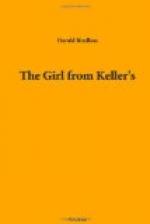Spring had come suddenly, as it does on the high Saskatchewan plains, and he was conscious of a strange, bracing but vaguely disturbing quality in the keen air. One felt moved to adventure and a longing for something new. Men with brain and muscle were needed in the wide, silent land that would soon waken to busy life; but one must not give way to romantic impulses. Stern experience had taught Festing caution, his views were utilitarian, and he distrusted sentiment. Still, looking back on years of strenuous effort that aimed at practical objects, he felt that there was something he had missed. One must work to live, but perhaps life had more to offer than the money one earned by toil.
The red glow on the horizon faded and an unbroken arch of dusky blue stretched above the plain. He passed a poplar bluff where the dead branches cut against the sky. The undergrowth had withered down and the wood was very quiet, with the snow-bleached grass growing about its edge, but he seemed to feel the pulse of returning life. The damp sod that the frost had lately left had a different smell. Then a faint measured throbbing came out of the distance, and he knew the beat of wings before a harsh, clanging call fell from the sky.
He stopped and watched a crescent of small dark bodies plane down on outstretched wings. The black geese were breaking their long journey to the marshes by the Arctic Sea; they would rest for a few days in the prairie sloos and then push on again. Their harsh clamor had a note of unrest and rang through the dark like a trumpet call, stirring the blood. The brant and bernicle beat their way North against the roaring winds, and man with a different instinct pressed on towards the West.
It was a rich land that rolled back before him towards the setting sun. Birch and poplar bluffs broke the wide expanse; there was good water in the winding creeks, a black soil that the wheat plant loved lay beneath the sod, and the hollows held shallow lakes that seldom quite dried up. Soon the land would be covered with grain; already there were scattered patches on which the small homesteaders labored to free themselves from debt. For the most part, their means and tools were inadequate, the haul to the elevators was long, and many would fall an easy prey to the mortgage robber. But things would soon be different; the railroad had come. For all that, Festing resolved that he would not be rash. His pay was good in the meantime, and he would wait.
By and by a cluster of buildings rose out of the grass. A light or two twinkled; a frame house, a sod stable, and straw-covered wheat bins that looked like huge beehives grew into shape. The homestead was good, as homesteads in the back townships went, but Festing knew the land was badly worked. Charnock had begun well, with money in the bank, but luck had been against him and he had got slack. Indeed this was Charnock’s trouble; when a job got difficult, he did not stay with it.




